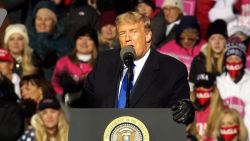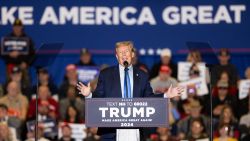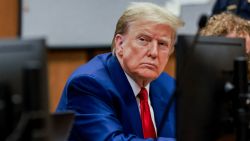Editor’s Note: Sign up to get our new weekly column as a newsletter. We’re looking back at the strongest, smartest opinion takes of the week from CNN and other outlets.
King Canute got a bad rap. The Viking chief who ruled England, Denmark and Norway in the 11th Century became infamous for a stunt that historians believe was misunderstood, if it even happened: sitting grandly in a throne at the seashore and ordering the ocean to stop the incoming waves. But the myth of the leader who tried to hold back the tide seemed to apply this week to the President of the United States.
George Floyd died on Memorial Day, his neck under the knee of a police officer. In the three weeks since, protests against police abuses have sparked a swift and searching national conversation about racism.
Cities and states have moved to ban chokeholds and create new safeguards against police misconduct. Companies large and small have committed to changes in the way they work, and in some cases, have replaced executives. Military leaders have spoken out forcefully against racism and shows of force against peaceful protesters. Networks canceled shows built around police as heroes. A Robert E. Lee statue in Richmond, Virginia, was toppled. And NASCAR banned the Confederate flag.
“Dare we believe,” asked Marcus Mabry, that this is the moment when America finally changes? “The trauma of 400 years of soul-destroying racism is not easily forgotten – some researchers believe it is imprinted in our very DNA. And we’re all too cognizant of the dashed promises of the past, from liberation to Reconstruction to the Civil Rights Movement. But change does come. History teaches us that. It came to South Africa. It came to the American South. Is this our moment?”
Van Jones wrote, “This sudden, mass realization – and the multi-racial demonstrations that give it weight, life and substance – feels like a miracle to me. As a black man, I have spent my entire life trying to convince relatively small numbers of white people to take racial injustice seriously. I have usually failed.
“Now major corporations are making my argument for me. Hundreds of thousands of white protesters are risking their lives in the middle of a pandemic to chant ‘Black Lives Matter.’ And I have begun to believe that – just maybe – the world for my two black sons might actually be a better place.”
Yet with the ground shifting all around him, Donald Trump refused to be drawn into the national mood. Instead he stuck to his “law and order” message and even tweeted that the incident of a 75-year-old protester who suffered a head injury when he was pushed by police might have been part of a setup. He seemed to want to turn back the clock to the days of his youth, when social unrest enabled Republican politicians of the 1960s to gain favor with frightened white voters.
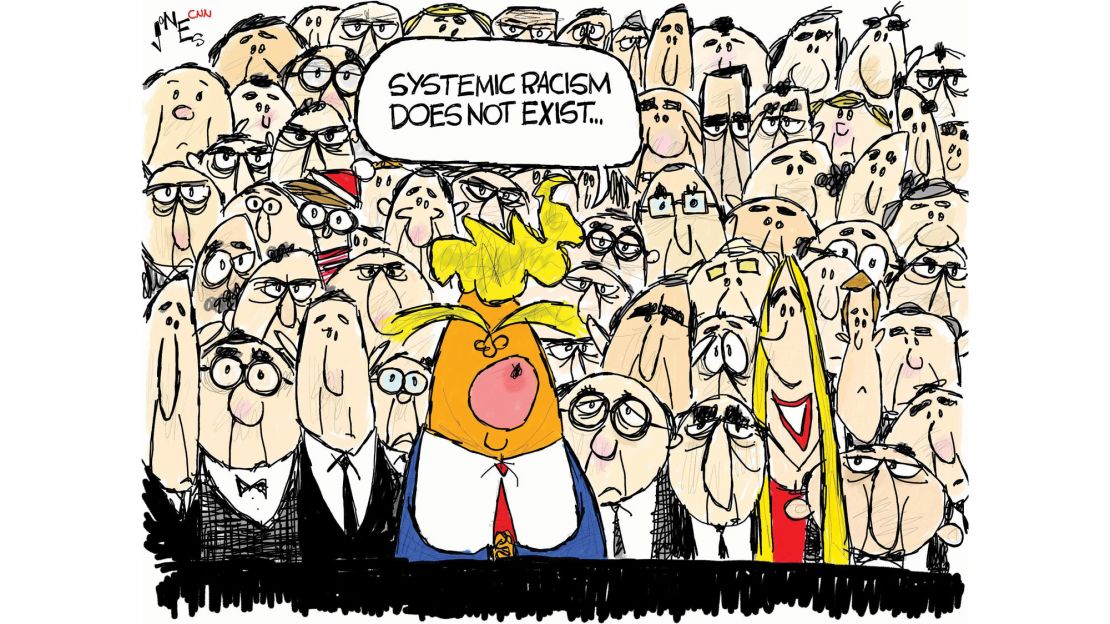
On one point though, Trump bent to criticism, rescheduling the date of his first rally since the pandemic began. He moved it from June 19, the holiday celebrating the end of slavery known as Juneteenth, to June 20 “out of respect.” Commentators had questioned the original date and location of the rally – Tulsa, Oklahoma.
Frida Ghitis wrote that Tulsa was “the site of a race massacre 99 years ago that remains one of the worst acts of racial violence in US history. In 1921, hundreds of African Americans were killed when white mobs looted and burned what had been a thriving neighborhood known as ‘Black Wall Street.’”
Not buying in
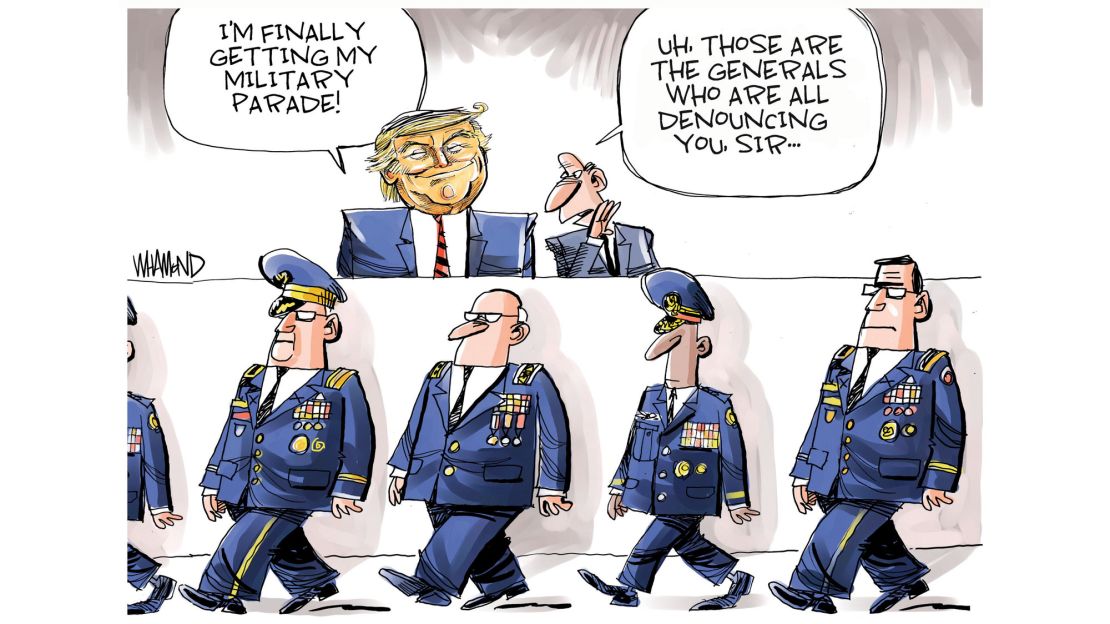
As “Black Lives Matter” morphed from activist slogan to nationally recognized belief, Trump didn’t buy in, wrote Dean Obeidallah. “While Trump has condemned the specific officers involved in the killing of Floyd as ‘a terrible insult to police and policemen,’ he refuses to address the racism embedded in the nation’s criminal justice system.” Attorney General William Barr, acting Department of Homeland Security head Chad Wolf and economic adviser Larry Kudlow all disputed the existence of “systemic racism” in law enforcement. “Instead, they seem to believe in essence there are just a few bad apples,” Obeidallah said. “This is stunning, given the data that makes it clear that our criminal justice system – as a whole – is far from color blind.”
As for Trump passing along the conspiracy theory about the 75-year-old protester in Buffalo, Jill Filipovic wrote, “The President’s potentially defamatory tweet deserves, like so many of his actions, swift response and condemnation. But members of his own party are so gutless and craven they deny having seen the tweet to begin with, presumably so that they might escape having to comment on it, or refuse to comment all together.”
Privately, GOP officials are much more likely to express dismay at what their party’s leader says and does, Washington reporters have noted. In New York Magazine, Andrew Sullivan wrote, “Trump’s response to the epidemic has more plainly revealed a man utterly out of his depth in ways even his strongest supporters must now quietly understand.”
Military chiefs who might be expected to share many aspects of Trump’s conservative worldview have been withering in their scorn for his recent stances, as Peter Bergen observed. “It has been extraordinary to see over the past week the flood of public criticism of President Donald Trump for his handling of the protests over the death of George Floyd coming from so many of the United States’ leading retired generals and admirals, including unprecedented criticism from four who have served in the post of top ranking military officer in the nation: chairman of the joint chiefs.”
Ask those who know
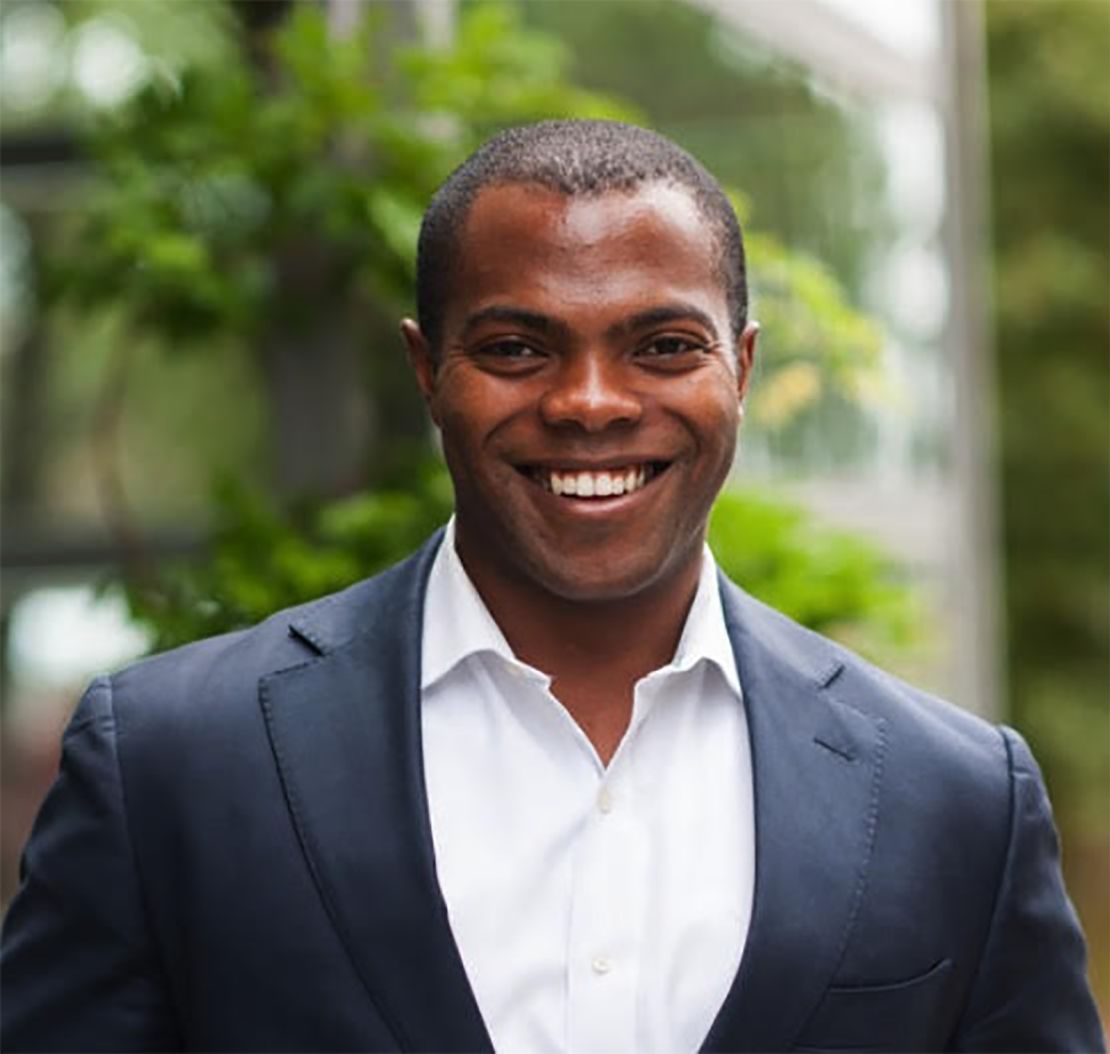
Ask Andre McGregor if there’s systemic bias in law enforcement.
Graduating from the FBI Academy was one of the proudest moments of his life. But, he wrote, “shortly after I graduated from Quantico, a cop friend in town … proceeded to walk me through a scenario: one day, I might be off-duty at 7-Eleven or Wawa getting food when someone tried to rob the store. I will want to intervene by pulling out my gun to detain the criminal. The cashier would call 911 and somehow in the heat of the moment my description would be confused with the perpetrator’s – so much so that the local cops would show up, see me with a gun and shoot me.” His friend’s advice: “If anything like that ever happened, I needed to put my gun down once I saw the red and blue lights pulling up, lie on the ground with my arms extended, let the cops handcuff me alongside the criminal, and they will sort out who I actually was later.”
This, McGregor wrote, was the “the black cop version of ‘the talk’ to avoid getting killed by one of our own. Apparently, it wouldn’t matter that I wore a badge too – and even the gold FBI badge at that – I should expect to be treated like the same criminals I was empowered to arrest.”
Former NYPD captain and now Brooklyn Borough President Eric Adams recalled participating in protests against “stop and frisk” by day and patrolling those protests at night. The key lesson for police departments, he wrote, should be to choose carefully those officers whose temperament makes them best suited for de-escalating situations that can turn violent. And taking action against abuses is vital.
“The history of complaints against Derek Chauvin before his encounter with George Floyd is a painful reminder that a failure to remove bad officers often leads to fatal outcomes,” Adams wrote. “If an officer displays any form of unprovoked aggression, let alone wanton disregard for human life, they should be held accountable.”
Phillip Atiba Goff, co-founder and chief executive officer of the Center for Policing Equity, wrote, “We starve the most vulnerable of services that could actually help. We eliminate social services and job training. We defund treatment for substance abuse and watch affordable housing vanish. Then we send law enforcement – the institution that was historically charged with enforcing our explicitly racist laws, from slavery to sundown towns – to deal with the aftermath.”
For more on policing:
Errol Louis: A head-spinning period of change on policing raises key question
Kenny Irby: Police reform is possible in America
Jason C. Johnson and James A. Gagliano: Defunding the police isn’t the answer
Elie Honig: Where the George Floyd case must be tried
Toppling
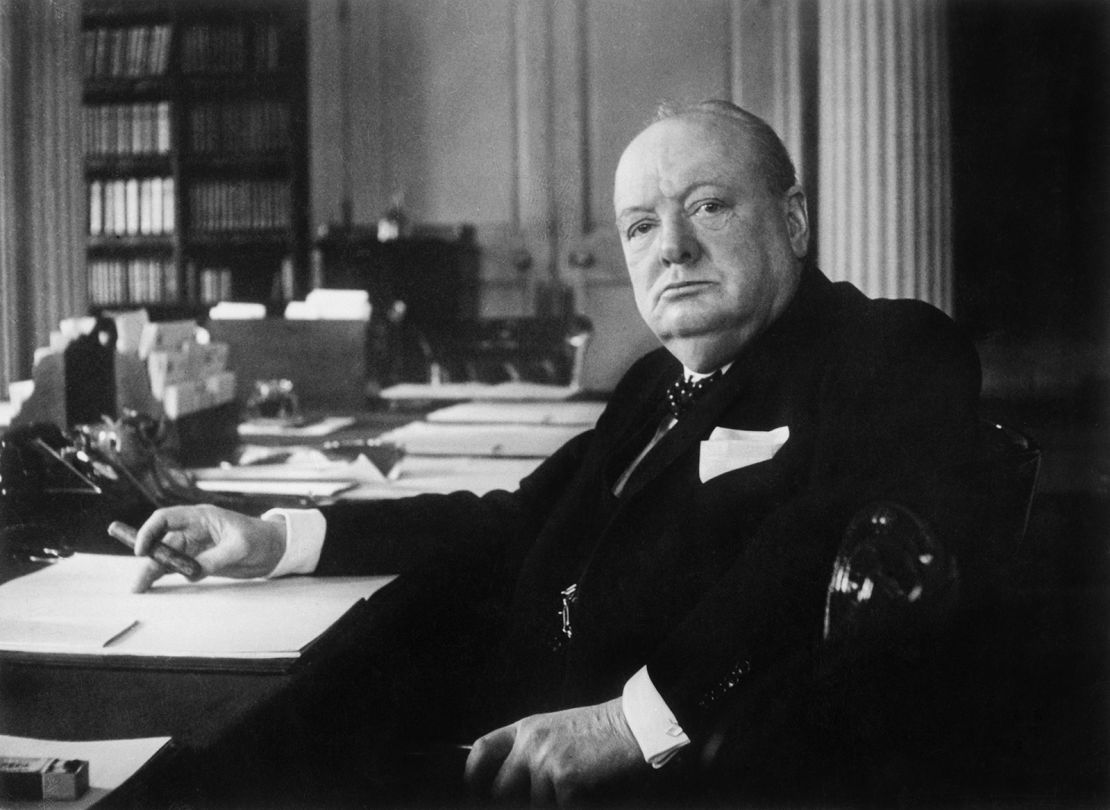
The George Floyd protests quickly went international, shining a light on current practices along with the legacy of imperialist history. The statue of a slave trader in Bristol, England, was toppled by protesters, as Holly Thomas noted. “A very brief examination of the characters and associations behind some of London’s most famous monuments reveals how many of our history’s ‘warts’ are not only omitted by plaques and commemorations, but echoed in the racist views and expressions of Britain’s leaders today. Sir Winston Churchill – Prime Minister Boris Johnson’s hero and the country’s most celebrated wartime leader – was outspoken in his belief of white superiority.”
UK historian Richard Toye, author of a book on Churchill and the British empire, wrote that the man who led his nation’s fight against Nazism in World War II was indeed a racist, but the matter is complicated. “Portraying Churchill as the root of all wickedness, as some of the more extreme social media comments appear to do, is as problematic as viewing him as the single-handed savior of freedom and democracy,” Toye argued. “By elevating him to a place of supreme importance – albeit by presenting him as uniquely wicked rather than splendidly virtuous – it reinforces Churchill’s own theory of history as driven by great white men. That is a vision from which, surely, we urgently need to break free.”
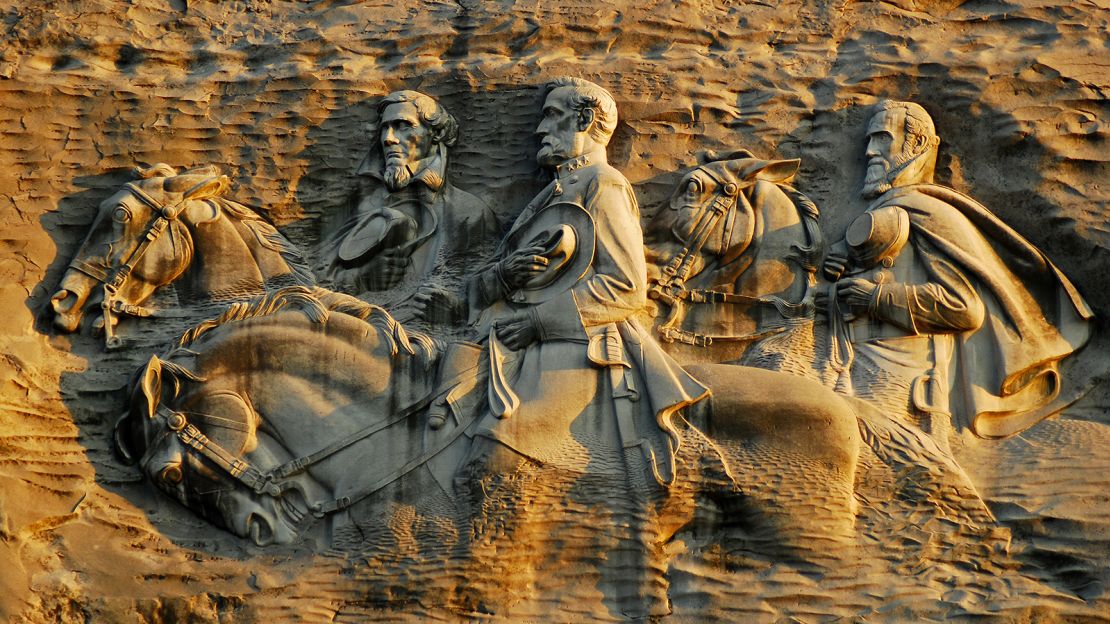
Not far from downtown Atlanta, Georgia, is a monument that has long been as controversial as statues of Winston Churchill became last week.
Carved into Stone Mountain are giant depictions of Confederate leaders. The project was conceived in 1914, in the midst of the Jim Crow era and with eventual backing from members of the KKK, which as George Shepherd noted, “met on the mountain’s top to burn crosses…”
“After the Supreme Court outlawed segregation in public schools in 1954, Southern states vowed a program of ‘Massive Resistance.’ Part of the resistance was installing more white-supremacist icons. This was when the State of Georgia purchased Stone Mountain; finished the huge carvings – bigger than the presidents on Mount Rushmore – of two Confederate military leaders, Stonewall Jackson and Lee, and the political leader, Jefferson Davis; and added the Confederate battle flag to Georgia’s state flag.”
This was “not an innocent artifact of Civil War history. Instead, they were a middle finger both to African Americans and to the federal government that was trying to end discrimination. Stone Mountain was such an evil icon that Rev. Martin Luther King Jr. invoked it in his ‘I have a dream’ speech.” It’s time to erase that and other Confederate monuments, as Germany has done with the statues and public swastikas of the Nazi era, Shepherd wrote.
On Monday, Bubba Wallace Jr., the only black full-time driver on the NASCAR circuit, called for the banning of Confederate flags at car rallies, and the organization swiftly agreed. “The elevation of the Confederate flag and the corresponding raising of monuments to soldiers who should be considered war criminals betrays our nation’s deepest commitments and principles,” wrote Peniel Joseph.
For other perspectives on race:
Jess Row: White people are already experts on racism
Jeff Pearlman: ‘Sorry’ is too little and too late, Roger Goodell
Bryan Monroe: America needs white people to step up
Ana Navarro: 19 ways to fight racism
The pandemic hasn’t gone away
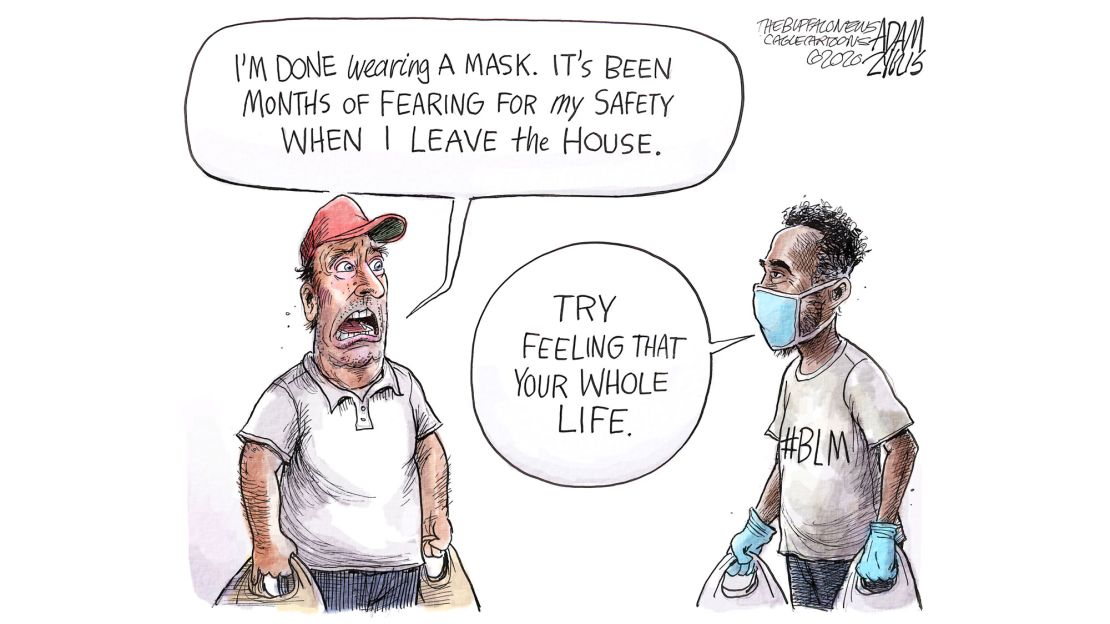
It may have been overshadowed, but the virus that causes Covid-19 is still spreading and killing. Experts projected that anywhere from tens of thousands to more than 100,000 Americans could die in the remaining months of 2020. They worried that the advice to wear masks and continue social distancing to stop the spread could be ignored in the rush to reopen the economy.
Debate continues over why some nations have seen much higher mortality rates than others, Dr. Kent Sepkowitz noted. Clues may be emerging in early genetic research, he observed, but there’s a danger in overemphasizing genetic factors. “A genetic predisposition can easily be mistaken as a death sentence, but in many cases, luck, exercise, and a good diet can still play a role in reducing the risk of disease,” Sepkowitz wrote. “Despite this, it’s easy to imagine that the emphasis on genetics could take the heat off political leaders like President Donald Trump or Brazil’s Jair Bolsonaro, who have downplayed their responsibilities during this crisis. How convenient it would be for them to be able to suggest that a disastrously managed, highly lethal pandemic outbreak was actually nothing more than the result of the wrong genes in the wrong place at the wrong time.”

April 22 was Jose Andrade-Garcia’s 62nd birthday. It was supposed to be the day he retired from his job at a pork processing plant in Marshalltown, Iowa, where he had worked for 20 years, wrote Thomas Lake. “There should have been ice cream cake, and a big party with the grandchildren at the house in Marshalltown, but the patriarch was in Iowa City, about 100 miles away, and a Zoom call was the best anyone could do. Through the rectangular frame of her cellphone, (his daughter) Maria saw her father. He wore a white gown. His eyes were closed, his eyelids swollen. His dark hair was turning white. His face was unshaven. He had a feeding tube in his nose and a breathing tube in his mouth.”
Maria had urged her dad to stay home when other workers started getting sick.
“‘Yeah, I should stay home,’ he said. But he kept going to work. … She couldn’t persuade her father to stay home when staying home might have saved his life.” Andrade-Garcia was determined to work till his retirement day.
Election worries
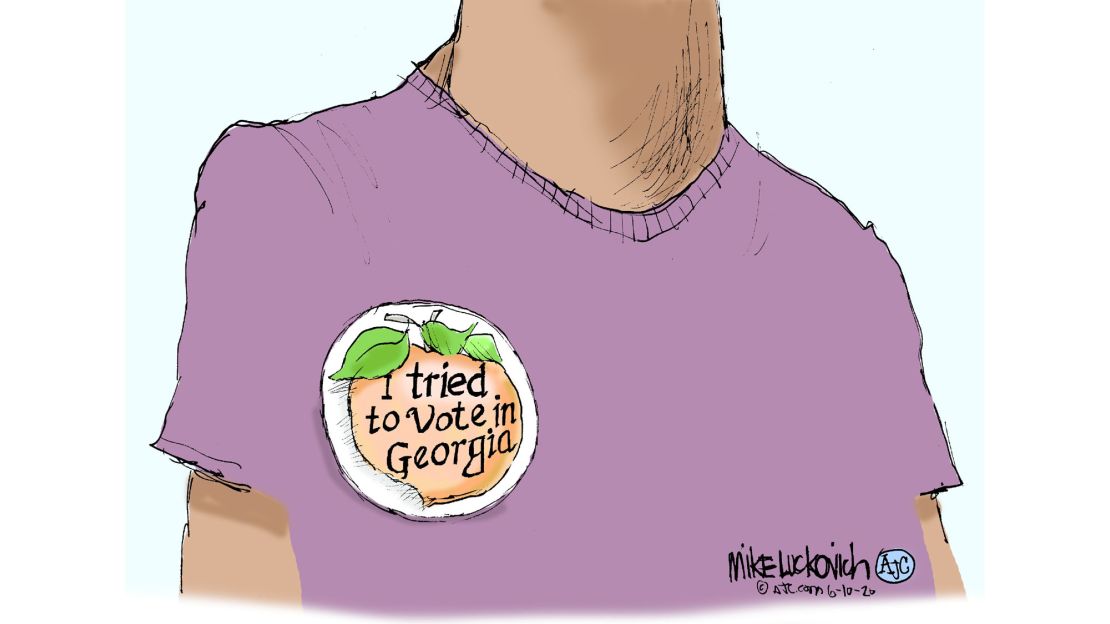
Less than five months before the November election, concern mounted about states being ready for the challenge of more than 130 million Americans voting during a pandemic. Enormous lines at Georgia polling places in this week’s primary were a bad sign. “Georgia was, essentially, a third-world country Tuesday,” wrote Issac Bailey. “Citizens attempting to cast their votes in the state’s primary had to stand in line for several hours, particularly those in areas with a higher percentage of black and brown residents. Many reasons emerged – none acceptable.”
Peter C. Goldmark Jr. and Steven L. Isenberg wrote that the threat potentially posed to the election by hacking needs to be taken more seriously than the federal government is doing and argued that a special effort by the National Governors’ Association could be the answer. “If we fail to act wisely and immediately against the threat of interference in our voting, we risk vast damage to the foundations of our democracy and our ability to continue as a self-governing society,” they said.
For more on Election 2020:
Michael D’Antonio: Time for Pence to jump ship?
James C. Moore: Trump may shoot himself in the foot with a split-city GOP convention
John Avlon: Trump drops ‘socialism’ tack and goes after ‘defund the police’
Douglas Heye: How does a governor get sweeping approval from the opposing party?
Don’t miss
Steven A. Holmes: I love the New York Times, but what they did was wrong
Samantha Vinograd: Trump’s use of unidentified security forces echoes Putin’s ‘little green men’
William Doyle and Pasi Sahlberg: Reopen schools with a ‘golden age of play’
Paul Rieckhoff: Trump’s VA is treating veterans with unproven drug
Ruth Ben-Ghiat: Attacks against US journalists are a stark warning
Christopher Reddy: A dangerous leak of diesel fuel in the Arctic
AND…
Gone with the Wind
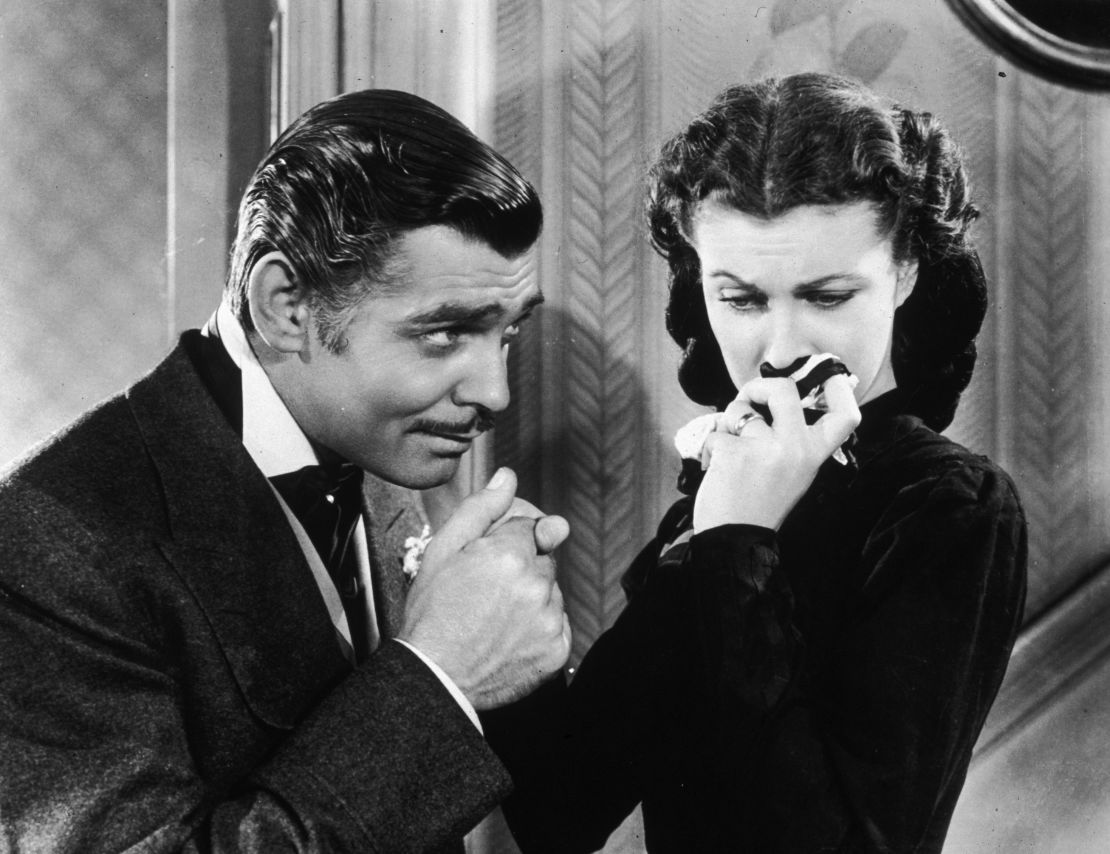
The 1939 Hollywood blockbuster “Gone with the Wind” was pulled from the new streaming service HBO Max in the wake of the George Floyd protests.
Jacqueline Stewart, who hosts “Silent Sunday Nights” on Turner Classic Movies, which, like HBO Max and CNN, is owned by WarnerMedia, wrote that “the film romanticizes slavery as a benign and benevolent institution.” The highest grossing film of all time when adjusted for inflation, it leaves out most of the cruel human costs of slavery, she wrote.
“Some complained that taking the film down was a form of censorship. For others, seeing Gone With the Wind featured so prominently in HBO Max’s launch felt like salt rubbed into wounds that have never been permitted to heal.”
“But it is precisely because of the ongoing, painful patterns of racial injustice and disregard for Black lives that Gone with the Wind should stay in circulation and remain available for viewing, analysis and discussion.”
HBO Max is planning to eventually bring back the film with Stewart offering “an introduction placing the film in its multiple historical contexts.” With books on racism dominating the bestseller lists now, she wrote, “this is an opportunity to think about what classic films can teach us … If people are really doing their homework, we may be poised to have our most informed, honest and productive national conversations yet about Black lives on screen and off.”













